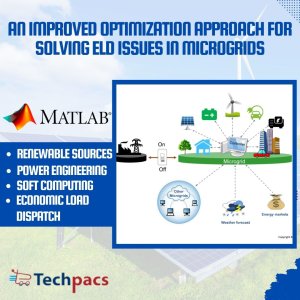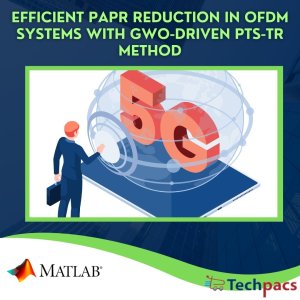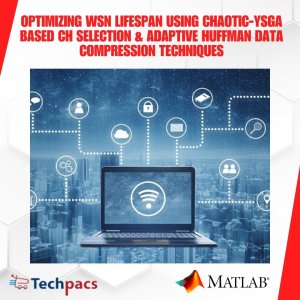An Innovative Approach for Economic Emission Dispatch in Microgrids using Grasshopper Optimization Algorithm
Problem Definition
The ELD (Economic Load Dispatch) problem in microgrids has posed a significant challenge for researchers due to its non-linear nature. While a variety of mathematical and optimization approaches have been explored in recent decades, traditional calculation-based techniques have proven inadequate to fully address this complex issue. The existing literature reveals a shift towards optimization techniques such as PSO, GA, and WOA in an effort to overcome the limitations of previous methods. However, researchers have encountered challenges in selecting the most efficient and suitable optimization technique for addressing ELD problems within microgrids. Furthermore, the slow convergence rates and tendency to become trapped in local minima of many optimization algorithms have increased computational time, highlighting the need for an effective and efficient optimization algorithm in microgrids to enhance the performance and productivity of ELD solutions.
Objective
The objective of this project is to address the challenges faced in Economic Load Dispatch (ELD), Economic Dispatch (ED), and Combined Economic Emission Dispatch (CEED) problems in Microgrids by introducing the Grasshopper Optimization Algorithm (GOA). The main goal is to reduce carbon emissions and fuel costs in Microgrids by optimizing the efficacy of conventional Generators, Wind energy system, and Solar energy system using GOA, known for its higher convergence rate and ability to avoid local minima. The project aims to provide a more effective method for solving multi-objective economic emission dispatch in a renewable integrated Microgrid.
Proposed Work
In this project, the focus is on addressing the challenges faced in Economic Load Dispatch (ELD), Economic Dispatch (ED), and Combined Economic Emission Dispatch (CEED) problems in Microgrids. The research gap identified from the literature survey shows that traditional calculation-based techniques have been ineffective due to the non-linearity feature of ELD problems. To overcome this, optimization techniques such as PSO, GA, and WOA have been explored by researchers, but many of these algorithms face slow convergence rates and local minima issues. Therefore, the proposed work aims to introduce an effective and efficient optimization algorithm, specifically the Grasshopper Optimization Algorithm (GOA), for resolving ELD, ED, and CEED issues in Microgrids.
The main objective of implementing GOA in this project is to reduce harmful carbon emissions and decrease fuel costs in Microgrids.
By utilizing GOA along with conventional Generators, Wind energy system, and Solar energy system, the efficacy of the three energy sources can be optimized. GOA was chosen for its higher convergence rate and ability to avoid getting trapped while searching for global minima. Additionally, GOA has shown positive outcomes in addressing constrained and unconstrained global optimization problems, making it a suitable choice for this project. Overall, the proposed work aims to introduce a more effective method for solving multi-objective economic emission dispatch in a renewable integrated Microgrid using the Grasshopper Optimization Algorithm.
Application Area for Industry
This project can be applied in various industrial sectors such as power generation, renewable energy, and microgrid management. The proposed solutions in this project address the challenges faced by industries in optimizing Economic Load Dispatch (ELD), Economic Dispatch (ED), and Combined Economic Emission Dispatch (CEED) problems in microgrids. By utilizing the Grasshopper Optimization Algorithm (GOA), this project offers a more efficient and effective way to optimize the performance of different power energy sources within microgrids, including conventional generators, wind energy systems, and solar energy systems.
The benefits of implementing the solutions proposed in this project include lower fuel costs, reduced harmful carbon emissions, and improved overall system performance. The use of GOA ensures faster convergence rates and prevents being trapped in local minima, leading to quicker and more accurate optimization results.
Industries can leverage these solutions to enhance the operational efficiency of their microgrid systems, reduce environmental impacts, and achieve cost savings in power generation and energy management processes.
Application Area for Academics
The proposed project focusing on the application of Grasshopper Optimization Algorithm (GOA) for solving Economic Load Dispatch (ELD), Economic Dispatch (ED), and Combined Economic Emission Dispatch (CEED) problems in Microgrids can significantly enrich academic research, education, and training in the field of optimization techniques for energy management systems.
Traditional calculation-based techniques have shown limitations in addressing the non-linearity feature of ELD problems in microgrids, leading researchers to explore optimization algorithms such as Particle Swarm Optimization (PSO), Genetic Algorithm (GA), and Whale Optimization Algorithm (WOA). However, slow convergence rates and local minima trapping often hinder the effectiveness of these algorithms. The introduction of an efficient and effective optimization algorithm like GOA can offer a novel approach to resolving ELD issues in microgrids.
The project's relevance lies in its potential to improve the cost and emission-efficiency of energy systems in microgrids, contributing to sustainable development and environmental protection.
By optimizing the performance of conventional generators, wind energy systems, and solar energy systems using GOA, researchers can explore innovative methods for achieving energy optimization objectives.
This project can serve as a valuable resource for researchers, MTech students, and PHD scholars in the field of energy management systems. The code and literature generated from this project can be utilized for further research, experimentation, and development of advanced optimization algorithms for microgrids. It can also facilitate hands-on learning experiences for students interested in exploring cutting-edge technologies in the field of renewable energy and optimization.
Future scope of this project includes expanding the application of GOA to other optimization problems in microgrids, exploring hybrid optimization techniques, and integrating machine learning algorithms for enhanced performance.
By leveraging the capabilities of GOA and advancing research in optimization methods for energy systems, this project holds promise for driving innovation and improvement in the field of sustainable energy management.
Algorithms Used
In order to mitigate the issues faced in conventional models, a new and effective method is proposed in this paper for solving the Economic Load Dispatch (ELD), Economic Dispatch (ED) and Combined Economic Emission Dispatch (CEED) problems in Microgrids. As mentioned in previous sections, that majority of optimization algorithms have slow convergence rate and gets trapped in local minima, therefore selecting an effective and efficient optimization algorithm is fundamental necessity. To combat this task, Grasshopper Optimization Algorithm (GOA) has been used in this paper for resolving ELD, ED and CEED issues in MGs. The main goal of the proposed approach is not only to lower the harmful carbon emissions that affect environment but to decease the cost of fuel. In order to achieve the desired objective, GOA has been used in the proposed work along with three power energy sources which included three conventional Generators, Wind energy system and Solar energy system.
The efficacy of the three energy systems is optimized by the GOA algorithm. One of the significant reasons why GOA is selected over other optimization algorithms is that it has higher convergence rate and doesn’t get trapped while searching for global minima. Another major reason for introducing GOA in the proposed work is that it produces positive outcomes when used to address constrained and unconstrained global optimization issues.
Keywords
SEO-optimized keywords: Microgrids, Economic dispatch, Fuel cost optimization, Optimization algorithms, Grasshopper Optimization Algorithm (GOA), Energy management, Power generation, Load forecasting, Demand-side management, Renewable energy integration, Energy efficiency, Microgrid operation, Distributed energy resources, Energy storage, Load balancing, Smart grids, Energy conservation, Artificial intelligence, ELD problems, Particle Swarm Optimization, Genetic Algorithm, Whale Optimization Algorithm, Optimization techniques, Convergence rates, Computational time, Economic Load Dispatch, Economic Dispatch, Combined Economic Emission Dispatch, Conventional Generators, Wind energy system, Solar energy system, Global minima, Constrained optimization, Unconstrained global optimization.
SEO Tags
Problem Definition, Mathematical approaches, Optimization techniques, Particle Swarm Optimization, PSO, Genetic Algorithm, GA, Whale Optimization Algorithm, WOA, Optimization algorithms, ELD problems, Microgrids, Convergence rates, Local minima, Computational time, Grasshopper Optimization Algorithm, GOA, Economic Load Dispatch, Economic Dispatch, Combined Economic Emission Dispatch, CEED problems, Energy sources, Conventional Generators, Wind energy system, Solar energy system, Carbon emissions, Fuel cost optimization, Environment, Power energy sources, Global minima, Constrained optimization, Unconstrained optimization, Energy management, Power generation, Load forecasting, Demand-side management, Renewable energy integration, Energy efficiency, Microgrid operation, Distributed energy resources, Energy storage, Load balancing, Smart grids, Energy conservation, Artificial intelligence.
| Shipping Cost |
|
No reviews found!

















































No comments found for this product. Be the first to comment!